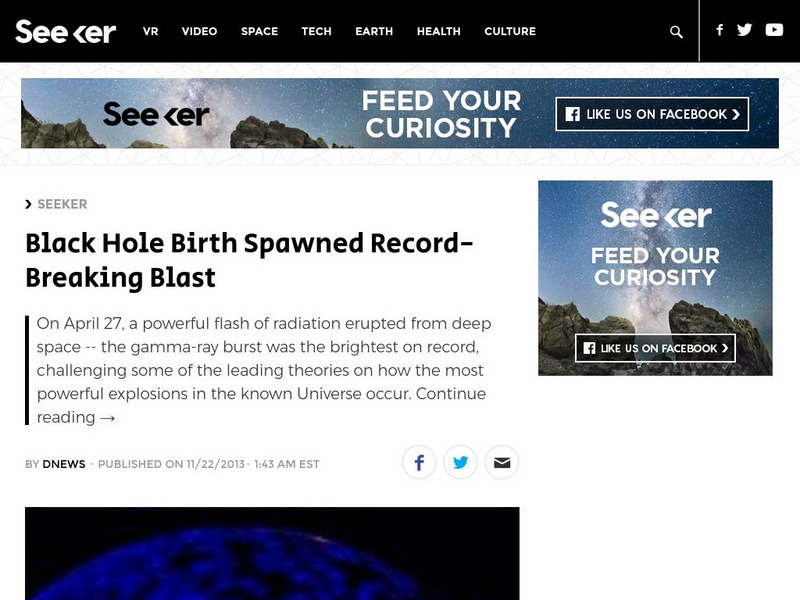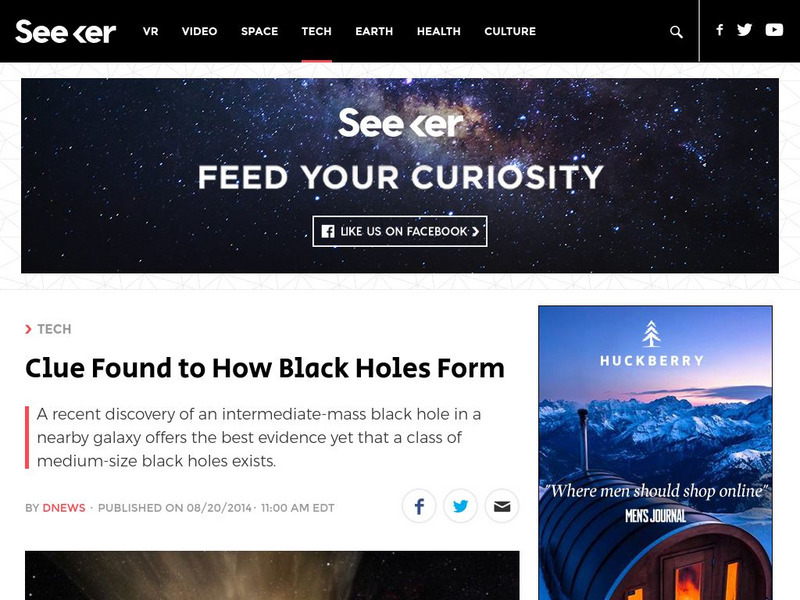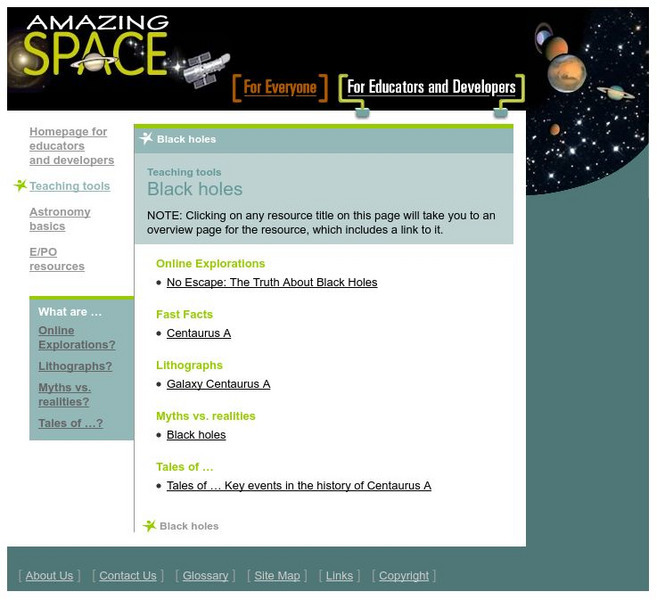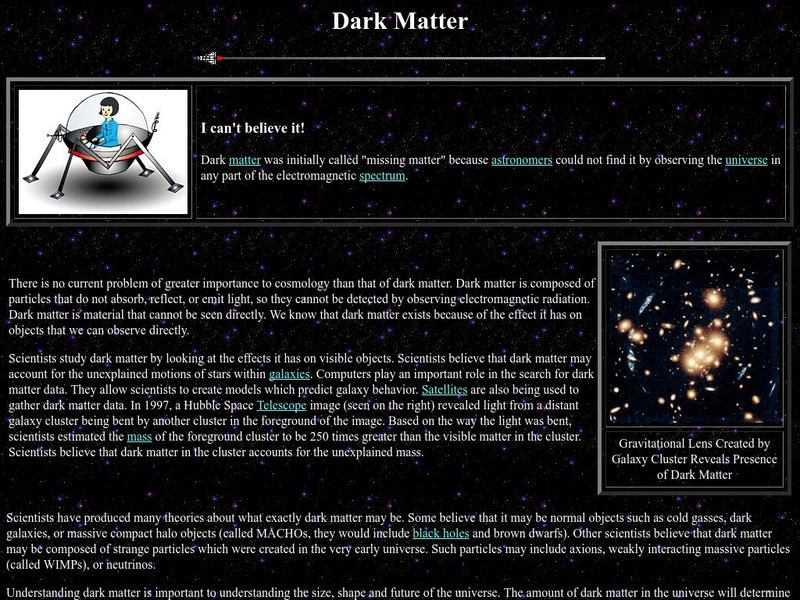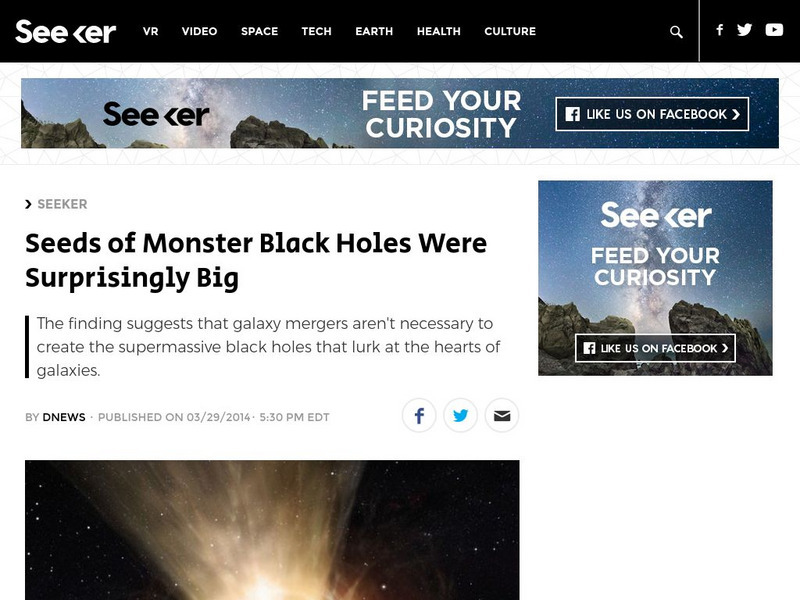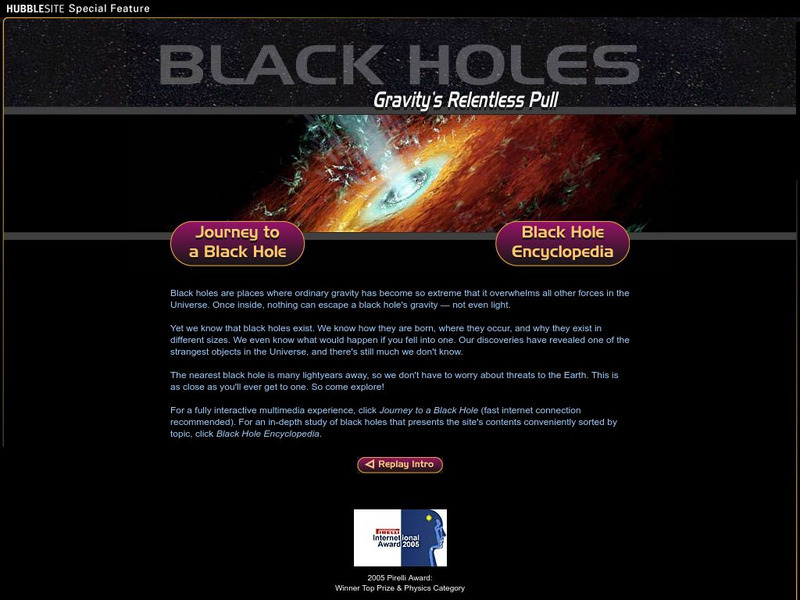California Institute of Technology
Cool Cosmos: Ask an Astronomer
Explore the mysteries of the black hole! Cool Cosmos presents the answers to the most frequently asked questions about this phenomenon. Kids can click on the easy to use question links to find out more.
Other
The Black Hole Encyclopedia
Explore an interactive encyclopedia of known and suspected black holes and find out how they are formed. Includes a glossary of terms, movie files and links to black holes in popular movies and books.
NASA
Nasa: Astronomy Picture of the Day: Virtual Trips to Black Holes. Neutron Stars
Learn more about black holes and neutron stars. View the MPEG video of a virtual trip into a black hole.
BBC
Bbc Newsround: Top 5 Amazing Space Discoveries
Read about some of the most important space discoveries in recent times.
BBC
Bbc Newsround: Special Waves From Black Holes Discovered
Learn about the discovery of gravitational waves made from two black holes colliding over a billion years ago!
Seeker
Seeker: Week of 8 27 15: Hawking Tries to Find Black Hole's Exit
Article reports on a theory from Stephen Hawking that postulates there may be a possible "emergency exit" from black holes. Includes a video [9:06]
NASA
Nasa: Star Child: Black Holes [Pdf]
This NASA teacher's guide provides educators with background information and classroom activities about black holes. Requires Adobe Reader. [PDF]
NASA
Nasa: Imagine the Universe: Imagine the Universe!
This helpful site provides everything you want to know about studying the universe. Take a look at the tools and methods scientists use to study the universe, discover some of the objects that make up our universe, learn how scientists...
Seeker
Seeker: Week of 11 25 13: Black Hole Birth Spawned Record Breaking Blast
Article reports on a recent record-breaking observation in space - the bright gamma-ray burst ever recorded.
Seeker
Seeker: Week of 8 25 14: How Do Black Holes Form? Clue Found
Learn what a black hole is and explore the latest scientific theories about how they form.
Seeker
Seeker: 'Doomsday' Ripples Through Galaxy
Learn about a storm errupting in the Teacup Galaxy involving the explosion of a supermassive black hole.
Other
Aas Science News: Possible Orphan Black Hole
Article reports on the discovery of a supermassive object 90 million light-years from Earth that may be an orphan black hole.
Space Telescope Science Institute
Amazing Space: Black Holes
This is an interesting and comprehensive resource for black holes. In addition to teaching you about black holes, it has quizzes to test your knowledge of the topic and a link to share your own essay on black holes.
NASA
Nasa: Image Science Center: Ask the Space Scientist
A NASA scientist, Dr. Sten Odenwald, answers many students' questions. Topics include planets, galaxies, black holes, the origin of the universe, and common misconceptions about space.
NASA
Nasa Star Child: Dark Matter (Level 2)
This site provides a description of "dark matter" and how scientists study it. Vocabulary words linked to a glossary of terms, and a printable version are also available on the site.
Harvard University
Universeforum: Black Holes
This site explores black holes in an easy-to-understand format. Answers such quesitons as, "What are black holes?" and "Do black holes really exist?"
Enchanted Learning
Enchanted Learning: Zoom Astronomy: All About Space
A fantastic collection of information about the solar system. Includes information on all of the planets, the moon, the sun, asteroids, comets, meteoroids, and stars. Also find puzzles, a dictionary, quizzes, classroom activities, and...
PBS
Pbs Teachers:monster of the Milky Way: Birth of a Black Hole
Discover how a dying star can be reborn as a black hole. View a slide show that follows the progression of events from an old, dying star to newborn black hole.
Seeker
Seeker: Week of 3 31 14: Seeds of Monster Black Holes Surprisingly Big
Article reports on new findings about the beginnings of black holes.
Space Telescope Science Institute
Black Holes: Gravity's Relentless Pull
This interactive site introduces the properties of black holes. You can travel to and into a black hole and see what happens to certain objects when they are placed in a black hole. Many interactive exercises to help illustrate the text...
Space Telescope Science Institute
Hubble Site: Black Holes
An incredible interactive site with a wealth of well-organized information about black holes. Take a simulated journey to a black hole or try one of the interactive experiments in the Black Hole Encyclopedia to see if you can safely...
Cosmos 4 kids
Cosmos4 Kids: Stars
A great site to find general information on stars and their place in the universe. Click on the topics on the right margin for additional information about stars.
Massachusetts Institute of Technology
Mit: Open Course Ware: Exploring Black Holes: General Relativity and Astrophysics
College-level physics course focusing on black holes. Course topics include general relativity, astrophysics, and elements of cosmology . Course features include selected video lectures, lecture notes, assignments, and exams.
Cosmos 4 kids
Cosmos4 Kids: Stars: Black Holes
Learn about black holes in our solar system. What are they? How are they formed? What is their structure? The brief, to the point text makes this site most appropriate for the younger researcher.




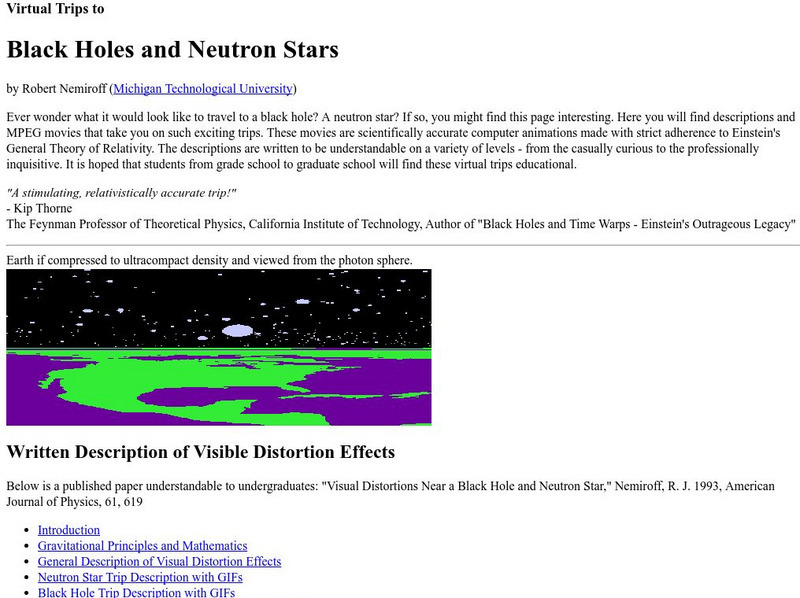



![Nasa: Star Child: Black Holes [Pdf] Unit Plan Nasa: Star Child: Black Holes [Pdf] Unit Plan](https://d15y2dacu3jp90.cloudfront.net/images/attachment_defaults/resource/large/FPO-knovation.png)

